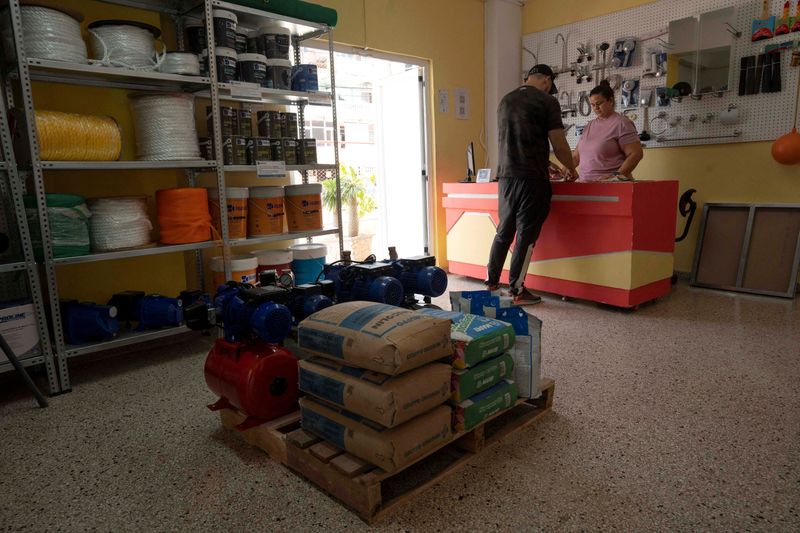By Marc Frank and Dave Sherwood
HAVANA (Reuters) - Cuba's booming private businesses braced for impact on Wednesday as the island's communist-run government implemented a raft of new laws aimed at more tightly regulating the private sector amid a deepening economic crisis.
The new rules come after less than three years of the legalization of private businesses following a decades-long ban put in place by former leader Fidel Castro.
The measures end incentives for the creation of new businesses, restrict independent wholesalers and add new requirements for applicants seeking to start a company. They also boost taxes, bolster worker's rights, tighten accounting requirements and sharpen oversight of the private sector.
The fresh regulations come into effect as Cuba navigates its worst economic crisis in decades, with severe shortages of food, fuel and medicine and a record-breaking exodus of its citizens.
The government says the reforms are necessary to correct distortions and boost the economy, while ensuring private enterprise benefits the broader population. Cities and towns can now deny a license to a business that doesn't fit within a local development plan, and municipalities may set prices in some cases.
"This is not a crusade against non-state forms of management … but rather, it brings them within the framework of legality," said Economy and Planning Minister Joaquin Alonso Vazquez, adding the measures would help develop the country.
William LeoGrande, a professor of Latin American politics and U.S. foreign policy at Washington's American University said the regulations "all have a similar effect of constraining the private sector, rather than unleashing it."
"The Cuban government needs the private sector to help the economy recover, but distrusts it and wants to keep it under tight state control," he added.
The stakes are high, says Oniel Diaz, co-founder of private business consultancy AUGE, which advises more than 200 Cuban small business clients.
Diaz said some of the rules, such as fighting tax evasion, are understandable while others will only slow further the ailing economy.
"The question is … whether or not these measures … contribute to getting the country out of the economic crisis in which it has been mired and the answer is no," said Diaz.
FILLING A VOID
The private sector has been a rare bright spot in an otherwise anemic economy that has failed to recover from the COVID-19 pandemic and remains saddled by a decades-long U.S. trade embargo that has complicated financial transactions by the Cuban government.
Cuba in three years has approved 11,355 private businesses. The sector's employees, together with 600,000 self-employed workers in Cuba, now account for 25% of jobs and 15% of imports, according to official data.
Small private retailers - a last remaining reliable and varied source of food - may be hardest hit by new accounting hurdles and a rule that requires wholesalers to work through state companies when importing from abroad, according to experts and business owners consulted by Reuters.
These small grocers and corner stores - common now in many Cuban cities - have filled a void left by a near-bankrupt state, importing and distributing more than a billion dollars of food and beverages in 2023, Diaz said.
“The(government) wants to restrict the activity … and allow spaces for (the state) to recover lost ground,” Diaz said.
Reuters spoke with several business owners who said they were still unclear how the regulations would be applied and how they might affect their business. They declined to speak on the record.

For many Cubans, who worry more about putting food on the table, any opportunity to buy goods is welcome - as long as the price is right.
"I think small business is the best thing going," said Alexander Silega, a 36-year-old self-employed Havana resident. "But we need some regulation in terms of prices."